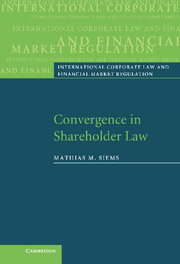Book contents
- Frontmatter
- Contents
- Preface and acknowledgments
- List of abbreviations
- Table of cases
- Table of legislation
- Introduction
- PART I The object and course of the investigation
- PART II The status quo of convergence
- PART III Developmental trends and patterns
- 7 Bases
- 8 Convergence through congruence
- 9 Convergence through pressure
- 10 Future convergences in shareholder law
- 11 Conclusions to Part III
- PART IV Conclusion
- References
- Index
10 - Future convergences in shareholder law
Published online by Cambridge University Press: 15 December 2009
- Frontmatter
- Contents
- Preface and acknowledgments
- List of abbreviations
- Table of cases
- Table of legislation
- Introduction
- PART I The object and course of the investigation
- PART II The status quo of convergence
- PART III Developmental trends and patterns
- 7 Bases
- 8 Convergence through congruence
- 9 Convergence through pressure
- 10 Future convergences in shareholder law
- 11 Conclusions to Part III
- PART IV Conclusion
- References
- Index
Summary
For the status quo of convergence in shareholder law (Part II above) the finding was that the ‘shareholder as such’ (Ch. 4) could in all the countries studied be characterized by the adjectives ‘profit-oriented’, ‘active’ and ‘informed’. Nonetheless, the continuing differences could also hamper the exercise of shareholder rights in foreign companies, so that, for instance, the question arises whether the law on notice periods, voting proxies etc., will continue to differ in future. In the case of provisions on the ‘shareholder's position in the power structure of the company’ (Ch. 5), the specific features in today's law are even more notable. Although in all the countries studied here the intrinsic decision-making powers, substantive legal protections and possibilities of legal action interpenetrate, there is greater room here for future convergence.
In this part I will investigate for both areas whether and how far the convergence forces (Chs. 8, 9) will lead to a further approximation of law. So as to avoid unreal historicism, this sort of forecast can admittedly only show some trends. But even from these it becomes clear whether, and with what substantive emphases, a further convergence of shareholder law may come about, making convergence a model for the future (Part 4).
The ‘shareholder as such’
According to the law of all the countries studied here, the shareholder can as a rule respond to a particular situation either through ‘voice’ or through ‘exit’.
- Type
- Chapter
- Information
- Convergence in Shareholder Law , pp. 336 - 365Publisher: Cambridge University PressPrint publication year: 2007



